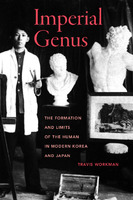Imperial Genus: The Formation and Limits of the Human in Modern Korea and Japan
Abstract
"Imperial Genus begins with the turn to world culture and ideas of the generally human in Japan’s cultural policy in Korea in 1919. How were concepts of the human’s genus‑being operative in the discourses of the Japanese empire? How did they inform the imagination and representation of modernity in colonial Korea? Travis Workman delves into these questions through texts in philosophy, literature, and social science. Imperial Genus focuses on how notions of human generality mediated uncertainty between the transcendental and the empirical, the universal and the particular, and empire and colony. It shows how cosmopolitan cultural principles, the proletarian arts, and Pan‑Asian imperial nationalism converged with practices of colonial governmentality. It is a genealogy of the various articulations of the human’s genus‑being within modern humanist thinking in East Asia, as well as an exploration of the limits of the human as both concept and historical figure."
Keywords
korean history; japanese occupation; korean literature; colonial korea; imperial japan; essentialism; Anthropology; Empire of Japan; Multiculturalism; ProletariatDOI
10.1525/luminos.9ISBN
9780520964198OCN
932330186Publisher
University of California PressPublisher website
https://www.ucpress.edu/Publication date and place
Oakland, California, 2016Series
Asia Pacific Modern,Classification
Asian history
Philosophy
Society and culture: general


 Download
Download Web Shop
Web Shop